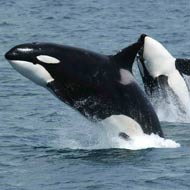
New killer whale experience will begin in 2017
SeaWorld is set to phase out its controversial orca displays in San Diego, its CEO has revealed.
The 'theatrical killer whale experience' will be replaced by a new show, which the company says will focus more on the whales' natural behaviours. The new experience will only be brought to San Diego, however, while the previous show will continue at SeaWorld's other two parks, San Antonio and Orlando.
Commenting on the new show, the company's CEO and president, Joel Manby, said: "…in 2017 we will launch an all new orca experience. It's going to be focused more on the natural setting, natural environment and also the natural behaviours of the whale and it'll have a strong conservation message.
"And that means that 2016 will be the last year of our theatrical killer whale experience called One Ocean."
While some have welcomed the change, many fear it is simply a 'repackaging' of the same show to reverse declining visitor numbers.
Whales and Dolphins Conservation UK said it is 'concerned that the definition of "shows" may well not be what everyone expects from this announcement, with SeaWorld still talking about orcas leaping and jumping being a "natural" behaviour'.
SeaWorld has seen visitor numbers and stocks plummet since the release of the documentary film Blackfish, which tells the story of Tilikum - a performing orca that killed several people whilst in captivity. Directed and produced by Gabriela Cowperthwaite, the film explores the cruel treatment of captive orcas.
In august this year, SeaWorld Entertainment revealed its profits had fallen by 84 per cent. To make matters worse, One Direction's Harry Styles recently urged concertgoers not to visit the theme park.
Just last month, California Coastal Commission approved an expansion of the park's pools, but only on the condition that no further breeding took place.



 The BSAVA has opened submissions for the BSAVA Clinical Research Abstracts 2026.
The BSAVA has opened submissions for the BSAVA Clinical Research Abstracts 2026.